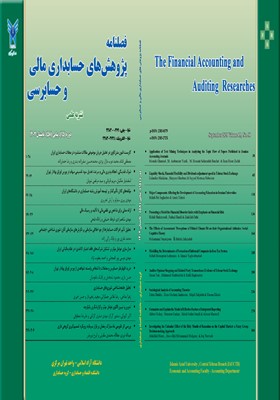مؤلفههای کلان تأثیرگذار بر توسعه آموزش رشته حسابداری در دانشگاههای ایران
محورهای موضوعی : حسابداری مالی و حسابرسی
مهدی پیری سقرلو
1
![]() ,
آرش تحریری
2
*
,
آرش تحریری
2
*
1 - گروه حسابداری، واحد تنکابن، دانشگاه آزاد اسلامی، تنکابن، ایران
2 - گروه حسابداری، دانشکده مدیریت دانشگاه تهران، تهران، ایران.
کلید واژه:
چکیده مقاله :
چکیده هدف: هدف این پژوهش، بررسی مؤلفههای کلان تأثیرگذار بر توسعه آموزش رشته حسابداری در دانشگاههای ایران میباشد. روش پژوهش: روش تحقیق پژوهش حاضر، تحلیل محتوای کیفی است. جامعه آماری این پژوهش اساتید حسابداری دانشگاههای برتر ایران که در پیدایش و توسعه حسابداری دانشگاهی در ایران تأثیرگذار بودهاند میباشد. راهبرد نمونهگیری این پژوهش نمونهگیری مبتنی بر هدف است. روش گردآوری دادهها، مصاحبه غیرساختارمند بوده که در سالهای 1398 و 1399 انجام شده است. یافته ها: تحلیل ها نشان میدهد که 10 مؤلفه کلان (مؤلفههای اقتصادی، فرهنگی، سیاسی، پدیدههای اجتماعی و تاریخی، دولت، الزامات قانونی، حسابخواهی و حسابدهی، دانشگاهها و سایر مراکز و نهادها، ارتباطات آموزشی و پژوهشی و صلاحیت و شایستگی دانشگاهها)، بر توسعه آموزش رشته حسابداری در دانشگاههای ایران تأثیرگذار است. نتیجهگیری: از میان سازههای دهگانه برآمده از نتایج پژوهش حاضر عواملاقتصادی، سیاسی و دولت بیشترین تأثیر را بر توسعه آموزش رشته حسابداری در دانشگاههای ایران داشته است. همچنین اقتصاد و سیستم آموزش عالی دولتی در ایران به عنوان مانعی در توسعه آموزش رشته حسابداری در دانشگاههای ایران شناسایی شد. یافته های این پژوهش میتواند به تصمیمگیرندگان در حوزه آموزش حسابداری در دانشگاههای کشور در راستای توسعه آموزش حسابداری کمک نماید
Abstract Objective: The purpose of this study is to investigate the major components affecting the development of accounting education in Iranian universities. Methods: The research method of the present study is qualitative content analysis. The statistical population of this research is the accounting professors of the top universities in Iran who have been influential in the emergence and development of academic accounting in Iran. Sampling strategy of this research is purposeful sampling. The data collection method was an unstructured interview that was conducted in 2018 and 2019. Results: Analyzes show that 10 macro components (economic, cultural, political, social, Social and historical phenomena, government, Legal requirements, Accountability and Responsibility, universities and other centers and institutions, Educational and research communications and the competence and competence of universities), is effective in the development of accounting education in Iranian universities. Conclusion: Among the ten structures resulting from the results of the present study, economic, political and government factors have had the greatest impact on the development of accounting education in Iranian universities. Also, the statehood of the economy and higher education system in Iran was identified as an obstacle in the development of accounting education in Iranian universities. The findings of this research can help decision makers in the field of accounting education in the country's universities in line with the development of accounting education.

